#75 (tie): 'Imitation of Life': The Reveal discusses all 100 of Sight & Sound’s Greatest Films of All Time
A journey through the Sight & Sound poll's 100 greatest films of all time arrives at Douglas Sirk's valedictory, socially conscious melodrama.
On December 1st, 2022, Sight & Sound magazine published “The Greatest Films of All Time,” a poll that’s been updated every 10 years since Bicycle Thieves topped the list in 1952. It is the closest thing movies have to a canon, with each edition reflecting the evolving taste of critics and changes in the culture at large. It’s also a nice checklist of essential cinema. Over the course of many weeks, months, and (likely) years, we’re running through the ranked list in reverse order and digging into the films as deep as we can. We hope you will take this journey with us.
Imitation of Life (1959)
Dir. Douglas Sirk
Ranking: #75 (tie)
Previous rankings: #93 (2012), #91 (1992)
Premise: An adaptation of Frannie Hurst’s 1933 novel—previously adapted by John Stahl in 1934—Douglas Sirk’s final feature film is the story of two single mothers, one Black and one white, who form a single household and raise their children together after a chance meeting at Coney Island in the summer of 1947. Lora (Lana Turner) is a widowed aspiring actress attempting to get a late start on her career while raising Susie (played as a child by Terry Burnham). After losing sight of her at the beach, Lora finds her being looked after by Annie (Juanita Moore), who’s there with her daughter Sarah Jane (played as a child by Sarah Dicker). With nowhere to stay, Annie offers her services as a housekeeper to Lora, who agrees, though she can’t afford to hire her. As Lora’s professional fortunes lift and she finds romance with an ambitious photographer named Steve (John Gavin), they continue to live together. Sarah Jane’s light skin allows her to be mistaken for white and not only does not try to correct this impression but actively attempts to hide it, and Annie. This dynamic continues in the film’s later scenes, set after Lora has become a star, Susie a vivacious teen (played by Sandra Dee), and Sarah Jane (now played by Susan Kohner) a troubled young woman still attempting to pass as white.
Keith: Imitation of Life is the only film by Douglas Sirk to make Sight & Sound’s Top 100 for 2022 and one of only two to make the top 250, with All That Heaven Allows landing at #136. That both seems too little given that Sirk’s best films, to my eyes at least, take the language of Hollywood filmmaking to their most sophisticated form, but it would also surprise Sirk’s contemporaries. Sirk’s movies found popular success and his actor’s were regularly nominated for Oscars, but they didn’t earn widespread critical acclaim until they were reassessed in later decades. This was also the German-born Sirk’s mic drop. He retired and departed for Switzerland.
He went out with a masterpiece, too, one that effortlessly weaves a concern with social issues into a beautifully crafted melodrama in which every element in every frame feels significant. For instance, Meredith finds success and acclaim and moves into the home of her dreams, but that awful clown painting suggests someone who’s trying too hard to look sophisticated and au courant.
Part of why I love Sirk is that his films do what, on the surface, they’re supposed to do. To watch Imitation of Life is to get swept up in the aspirations and heartaches of Lora, Annie, Sarah Jane and, to a lesser extent, Susie (but we can get to that later), as told by a director with a peerless command of Hollywood mechanics. This movie wrecks me every time. But it’s also the work of someone who doesn’t want those mechanics to do all the work. Yes, it’s the story of Lora’s career, but all the while Annie’s story provides a counterpoint. Lora wants to conquer the world. Annie wants safety and shelter and, at the end of it all, a beautiful funeral. She undoubtedly loves Lora and Susie. The closest she comes to criticizing either is when she tells Lora “you never asked” when Lora expresses surprise that Annie has friends. But the way she lives her life is a kind of silent critique of the dreams allowed to white people but denied to her.
The film offers more explicit critiques, too. Sarah Jane wants more from life than her mother and feels that she’ll never be allowed it unless she passes as white. Imitation of Life depicts Sarah Jane as tortured and destructive but it also never suggests she’s wrong, starting with the reaction of her unsuspecting elementary school classmates when Annie unexpectedly shows up at her classroom door with rain boots. The home she and her mother make with Meredith and Susie is a safe haven, but she’s rejected every time brushes against the wider white world.
The film is also partly about the limits of Lora and Susie’s understanding. They’re not racist, which sets them apart from many of their era, but neither really treats Annie and Sarah Jane as equals, in ways both overt and subtle. Annie never really gets promoted from being Lora’s domestic servant—a departure from the 1934 version, but the two equivalent characters have their own unequal power dynamic in that one—and there’s always a whiff of condescension to Lora’s treatment of her, no matter how clearly she loves and depends on her. This isn’t a message movie in the purest sense, and I think it’s all the more effective for letting the story carry the ideas.
Scott, do you have any general thoughts on Sirk? Is it a coincidence that his most socially conscious film is ranked the highest on this poll? Finally, I haven’t even touched on the performances. Turner and Moore bring strikingly different approaches to their roles. Is that part of why it works?
Scott: My general thought on Sirk is that I’m powerless to resist him, even when (or maybe especially when) the melodrama maxes out on floridness. The sheer busyness of Imitation of Life—the kids today would say that “it goes hard”—makes me wish another Sirk, like All That Heaven Allows or Written on the Wind, would get equal consideration from Sight & Sound voters, but there’s so much here to sink your teeth into. In preparation for these conversations, I always take notes on one screen while watching on the other and my document for Imitation of Life is 2,063 words long, crammed with dramatic incident, important lines, and asterisks on moments or observations that I felt were particularly important (e.g. “** ‘How do you explain to your child that she was born to be hurt?’”).
Up front, I’m awed by the complexity of Imitation of Life, particularly in regard to how the racial dynamics reflect on Lora and Susie, who would honestly identify Annie and Sarah Jane as their closest friends—extended family, really—yet have these blind spots that are enforced by their whiteness and by societal attitudes as a whole. To have the final deathbed twist of Lora and Annie’s relationship be that Lora didn’t really know important pieces of Annie’s life is a startlingly audacious moment. I’m reminded again of how sophisticated and modern and progressive people assume a movie made today would be in comparison to a movie made in the late 1950s, and that’s just not the case. On our podcast The Next Picture Show, we paired Imitation of Life with Rebecca Hall’s Passing, which obviously owes the Sirk film a tremendous debt, but Green Book won Best Picture a few years earlier and you’d have trouble making the argument that the friendship between a Black pianist and his white driver/bodyguard in that film undergoes anything like the same scrutiny. Working from Hurst’s novel Sirk doesn’t engineer the events to make us feel good. He simply makes us feel.
I’d be curious to hear your thoughts on Lana Turner and Juanita Moore’s performances and their “strikingly different” approaches to their roles, because I’m not sure I see it, other than Turner leaning into the theatricality (for lack of a better term) of an ambitious stage actress who finds the fame and wealth that she seeks and Moore playing Annie with a reserved self-effacement that seems appropriate to the character. I think Lora and Annie are naturally an odd couple on a number of fronts that are served by the performances, two women bound by single motherhood and dire economic circumstances, but separated by race and a power imbalance inherent to their relationship. To be fair to Lora, her ascendency as a Broadway star affects everyone in her life, not just Annie, as they gain prosperity and comfort, but lose a lot of her attention. Susie, for one, grows up with Annie more of a mother figure to her than Nora.
And that’s just part of the rich stew that is Imitation of Life, a film in which Sirk tackles so many issues at once that it’s hard to know what to talk about first. One question I have for you, Keith, is what you make of the film’s perspective on modern womanhood and motherhood, which doesn’t strike me as progressively-minded as I might have expected. The widow in Sirk’s All That Heaven Allows defies her adult children and rich friends by seeking new love with her gardener, rather than settling into a lonely domestic routine (with her new TV) as they push her to do. But Lora’s dream of becoming an actress is framed here as regrettable and even selfish, because her success makes her disengaged with her loved ones and perhaps blind to what’s happening with Annie and Sarah Jane. I use the word “perhaps” here because it seems likely that Lora would miss certain realities regardless, but I was struck by how much the film seemed to be suggesting that women pursuing their career ambitions are destined for unhappiness.
Or maybe it’s not so simple. If you contrast Lora with Steve, her on-again/off-again/on-again boyfriend, she lashes out at him for surrendering his loftier goals as an art photographer to get into the advertising business. But maybe the message here is that it’s a virtue to prioritize the people you care about, and make the necessary sacrifices for them.
But I don’t want to bury the lede too much here, because it’s really the film’s treatment of race that gives it such distinction and dramatic life. That line that I quoted earlier from Annie about Sarah Jane (“How do you explain to your child that she was born to be hurt?”) not only pierces the heart, but makes Sarah Jane’s hurtful actions a completely rational response to her situation. Early in the film, she angrily rejects little Susie’s offer of a Black doll just before she and her mother head off to bed in the tiny room off the kitchen in Lora’s modest apartment. She knows from her mother that going through life as a Black woman will have challenges and hardships and limits that put her in such restrictive spaces her entire life. And so passing as white makes her path much easier, even though it hurts her mother and clouds her identity.
Then again, the life she does pursue is empty and degrading, and has a sexual charge that the film depicts as unseemly. At the same time, Sirk does show Sarah Jane confronted by startling acts of racism, none more shocking than the beating she takes from a white boyfriend who learns about her true identity. For Sarah Jane to use that incident as another reason to lash out at her mother deepens the tragedy, shifting the blame where it doesn’t belong. “It’s a sin to be ashamed of what you are,” Annie tells a young Sarah Jane. But Sirk is always so keen on how being who you are can have consequences in an unjust society.
Keith: Looking back, it might be more a difference in characters than acting styles that separates Turner and Moore’s performances. I didn’t mean to suggest they were at odds with one another so much as that Turner plays Lora as a woman incapable of hiding her emotions and desires whereas Moore plays Annie as a woman used to smiling through pain. That’s apparent in her first scene, in which her expression seems at odds with her description of her dire straits. Or it would be if Annie hadn’t learned how to navigate life this way, and to draw on her faith that everything would work out. That she loses this as her hope and life slip away is one of the film’s most devastating features.
I think it’s tough to pin down the film’s attitude to Lora. My sense is that we’re supposed to believe that she is the incredible talent others believe her to be, as gifted at high comedy as intense drama. (The great Italian director Amerigo Felluci wants to work with her!) But there’s a cost for this, that you lay out above, and it’s one paid not just by her but by those around her who want to be close to her. To my eyes, it doesn’t quite play as a condemnation. I think we’re supposed to see her as Annie sees her: with understanding and forgiveness.
This also leads to what I think is the least compelling element of Imitation of Life. As Sarah Jane abandons her mother for a journey on the wild(ish) side of life, Susie develops a crush on Steve, a situation only made possible by her mother’s absence. I like Sandra Dee’s bubbly, breathless performance as Susie, but I just can’t bring myself to care about her lovelorn situation in the same way I care about Annie and Sarah Jane. (Or at all, really.) Again, I think this film is a masterpiece—though All that Heaven Allows might match it in the Sirk filmography—but its final stretch feels a little out of balance to my eyes.
We should talk a bit about the surface elements of the film, which are anything but superficial. Ross Hunter produced the film, as he did many of Sirk’s Hollywood movies, and the glamorous trappings and costumes are as much Hunter’s trademark as Sirk’s. (Pillow Talk was Hunter’s other big 1959 film.) What do you make of Sirk’s use of these here (and elsewhere)? I think they serve a dual purpose. They help to heighten the melodrama—it’s a movie so it should be glamorous—but I also feel like there’s an element of critique to the way Sirk uses them. Lora gets all she desires (to paraphrase another Sirk title) but does it matter? Again, that tacky clown painting feels like an acknowledgment of her dreams’ limitations. In contrast, Annie lives humbly except for the elaborate funeral she plans for herself, complete with Mahalia Jackson and a brass band. Her one indulgence is one she’ll never enjoy. What do you think this means, to her and to the film?
For that matter, what do you make of the ending? This is one of those films, like others we talk about, where I notice something new each time. But one detail eluded me until stumbling on a piece at Senses of Cinema by Claire White where she points out that we never see Lora and Susie speak to each other at Annie’s funeral. White also describes the ending as “hopeless.” I’m not sure I’d go that far, but it is bleak, and it’s certainly possible to see it as hopeless in light of a Sirk quote the piece references: “[T]he look of a child is always so fascinating. It seems to be saying: Is this what fate has in store for me, too?” Do you see only unhappiness ahead for Susie and Sarah Jane? Maybe happiness was the coldwater flat they shared. The presence of the kindly milkman who Annie, but not Lora, remembered amongst the mourners seems to suggest as much, doesn’t it?
Scott: “Hopeless” is too strong a word for me, though we do leave our surviving characters at a very sad moment. They’re at the funeral of someone they cared about and didn’t fully understand while she was alive. Susie has a broken heart. Sarah Jane is utterly distraught and tormented by unrelieved guilt. Lora is filled with regret. And the streets are lined with Black mourners who are honoring the passing of someone whose once-invisible presence is now crushingly visible for all to see. You ask why Annie has invested so much of her money into her own funeral and I have no answers, other than to speculate that she wanted in some way to be seen as important and not someone who remained in the shadows until they consumed her entirely. (Either that or she’s staging the most passive-aggressive guilt trip of all time.)
But hopeless? I don’t know. The glass-half-full takeaway from the funeral is that it’s enlightening. Perhaps knowing the breadth of Annie’s involvement in the church and in the Black community will force a necessary change in perspective in Lora and Susie and perhaps Sarah Jane will think about herself differently and choose to take a harder, truer path. You say that Annie's one indulgence is one “she’ll never enjoy,” and that is obviously true. But what if it’s not an indulgence? What if it’s a gift? It could be a gift for the three people she cares about most just as it’s a gift for us as viewers to consider the full depth of her loss and acknowledge the community that lays her to rest. I have to imagine an audience in 1959 would be shaken by that ending and that’s a net good for society (and, I hope, these characters).
I completely agree with you that the grown-up Susie’s infatuation with Steve is the least compelling of the film’s abundance of subplots. I don’t know what to make of Sandra Dee’s performance as teenaged Susie, because it does seem like a deliberate extension of the blinkered exuberance of her childhood self. She’s an earnest, good-hearted kid who has turned into an earnest, good-hearted adult without being touched by maturity and awareness—which is, in a way, the privilege of her whiteness. You wonder how Susie could be so close to Sarah Jane all those years without registering the seriousness of her situation, other than to try to comfort her and discourage her from acting out. Her “love” for Steve has the symbolic value of being a testament of her mother’s disconnection from both parties, but it’s a contrivance that the film doesn’t make entirely believable.
Plus, Steve is a bit of a drip, no? What did you think of the men in Lora’s life? Steve is certainly the most appealing among them, but I’m struck by the transactional nature of her other relationships. Sirk stages an unsettling casting couch scene where Lora’s prospective theatrical agent Loomis (Robert Alda, father of Alan) preys on her desperation as an aspiring actress who bluffed her way into his office and is coming into the profession too late. He has “cast” her as a woman to be exploited and she rightly stands up for herself in the moment, but when he calls with an opportunity, she has to take it and Loomis becomes a fixture in her life. Later, when David Edwards (Dan O’Herlihy), a comic playwright, gives Lora her big shot and writes her multiple hit plays, he expects her eternity loyalty and her romantic affection.
Is there a unifying theme here? Sirk is so perceptive in understanding the boxes that people, women especially, find themselves in, driven by societal forces and expectations. The racism that bears down on Annie and Sarah Jane is obviously more imposing than the challenges that Lora faces, but all these characters are strait-jacketed in some way, even after Lora finds success and the freedom that ostensibly comes with it.
To close this out, Keith, I’m curious to hear how you think this compares to the earlier adaptation of the book. And are there any moments in the film that are particularly striking to you?
Keith: It’s been a couple of years since I watched the Stahl version so my memory isn’t immediate. But, having already seen the Sirk version, I went into the 1934 versionexpecting a much lesser attempt at the same story and was surprised to find a movie that was pretty formidable in its own right. It’s not at the level of Sirk’s version, but Claudette Colbert and Louise Beavers are both remarkable as Bea and Delilah, this adaptation's Lora and Annie equivalents, respectively. Fredi Washington, a Black actress and civil rights activist, is good, too. It’s also no softer in dealing with the racial disparity, though perhaps not quite as aware of their complexity as Sirk’s version or as open to moments that critique its white character’s action. It also keeps going past the point of Delilah’s funeral, which only underscores Sirk’s boldness in ending the film. The differences and similarities are pretty fascinating. I’d recommend checking it out if you get the chance.
As for striking moments, there’s a lot to choose from. That casting couch scene with Loomis is unsettling, both as a pre-#MeToo depiction of such an encounter and because it’s not hard to see why a woman in Lora’s position would just go along with it. He’s a creep, but he’s also telling it like it is. That he remains a part of Lora’s life feels like a telling detail. But the moment that sears itself into memory is Sarah Jane silently mouthing “mama” in her final encounter with Annie. It’s made heartbreaking by the way Kohner plays it, butall the moments and details leading up to it make it seem both tragic and inevitable. Again, everything counts in this movie. Scott, final thoughts?
Scott: My main thought is a wish that more filmmakers today would engage so provocatively with the different set of social pressures that face the Loras and Annies in these ostensibly more enlightened times—and, relatedly, a wish for melodramas with the level of passion and cinematic vibrancy that Sirk brings to the table. Imitation of Life is certainly a lot of movie—as I wrote earlier, I slightly prefer the more focused likes of Sirk classics like All That Heaven Allows and Written on the Wind—but it’s absolutely riveting at every moment, because the emotional stakes are so high. You have so much here to engage your eyes, your mind, and your emotions.
As for favorite moments, the majority of them involve Annie and Sarah Jane, who Juanita Moore and Susan Kohner play at very different temperatures, but are devastating in their own ways. One of the lines that gets me is a conversation between Susie and Sarah Jane before Sarah Jane sneaks out with her white boyfriend. She says, “I’m going to be everything he thinks I am.” Her reward for erasing an essential part of herself—the part that bonds her to her mother, whose Blackness is not deniable—is a beating at the hands of a virulent racist, who leaves her crumpled in a puddle. She will learn later that her mother is not to blame for what happens to her, in that utterly wrenching public scene at the funeral, but the cold logic of her “passing” is a shame that Sirk lays at society’s feet.
Next: Spirited Away (2001)
#95 (tie): Get Out
#95 (tie): The General
#95 (tie): Black Girl
#95 (tie): Tropical Malady
#95 (tie): Once Upon a Time in the West
#95 (tie): A Man Escaped
#90 (tie): Yi Yi
#90 (tie): Ugetsu
#90 (tie): The Earrings of Madame De…
#90 (tie): Parasite
#90 (tie): The Leopard
#88 (tie): The Shining
#88 (tie): Chungking Express
#85 (tie): Pierrot le Fou
#85 (tie): Blue Velvet
#85 (tie): The Spirit of the Beehive
#78 (tie): Histoire(s) du Cinéma
#78 (tie): A Matter of Life and Death
#78 (tie): Celine and Julie Go Boating
#78 (tie): Modern Times
#78 (tie): A Brighter Summer Day
#78 (tie): Sunset Boulevard
#78 (tie): Sátántangó





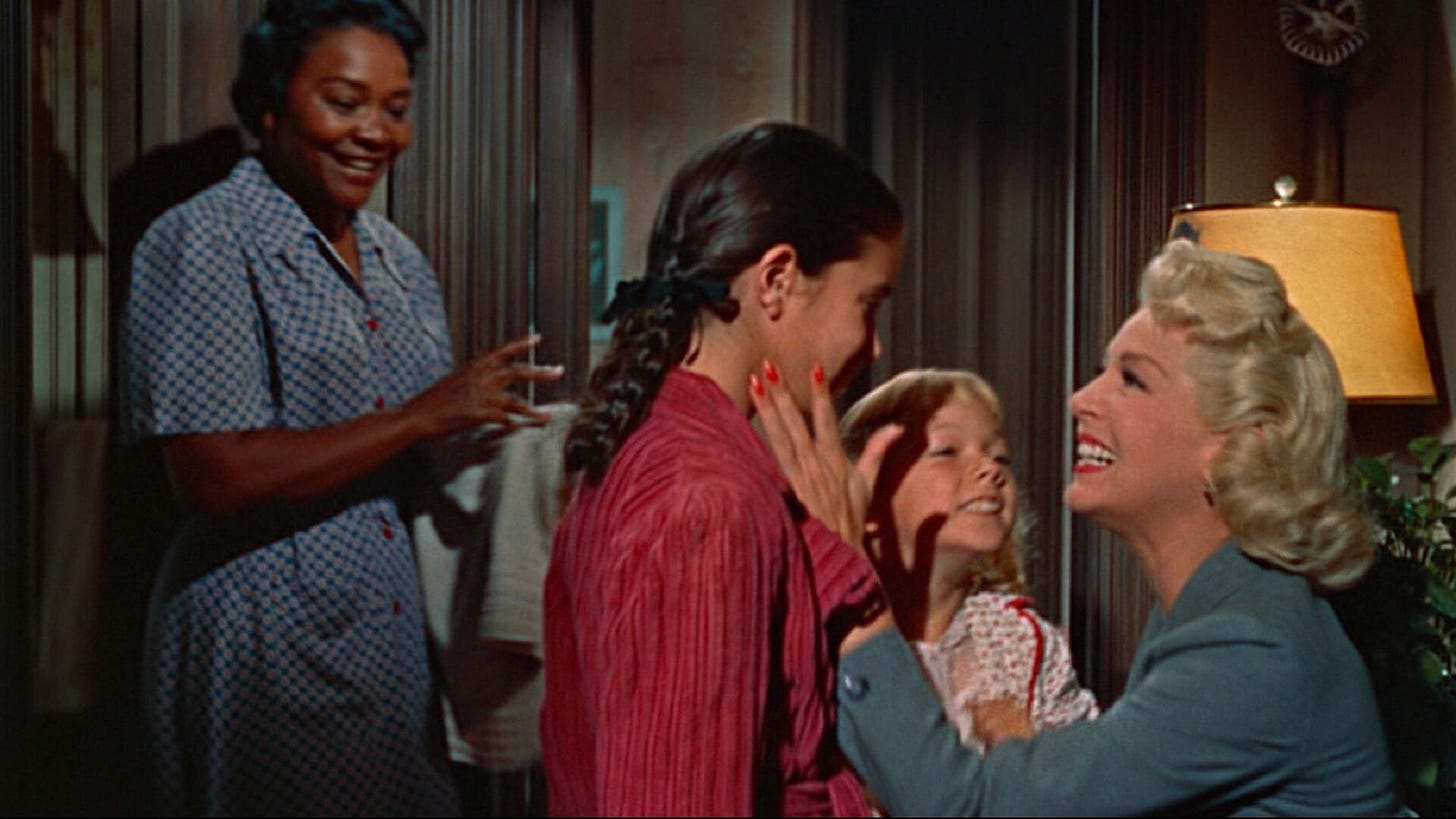
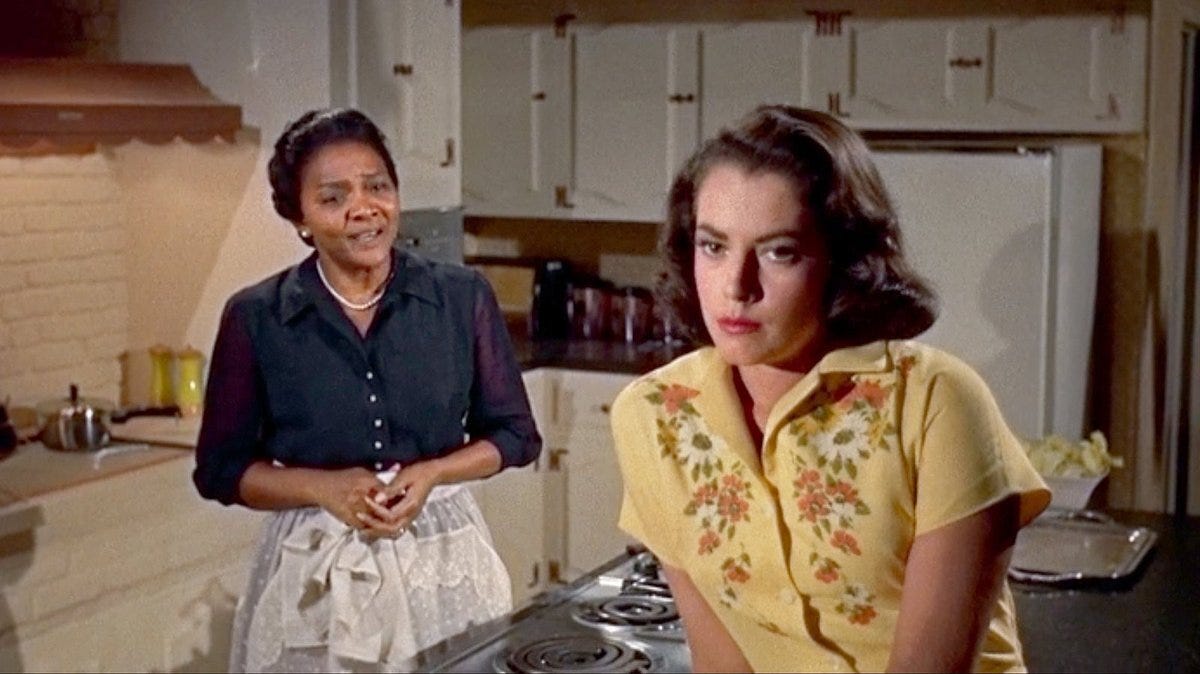
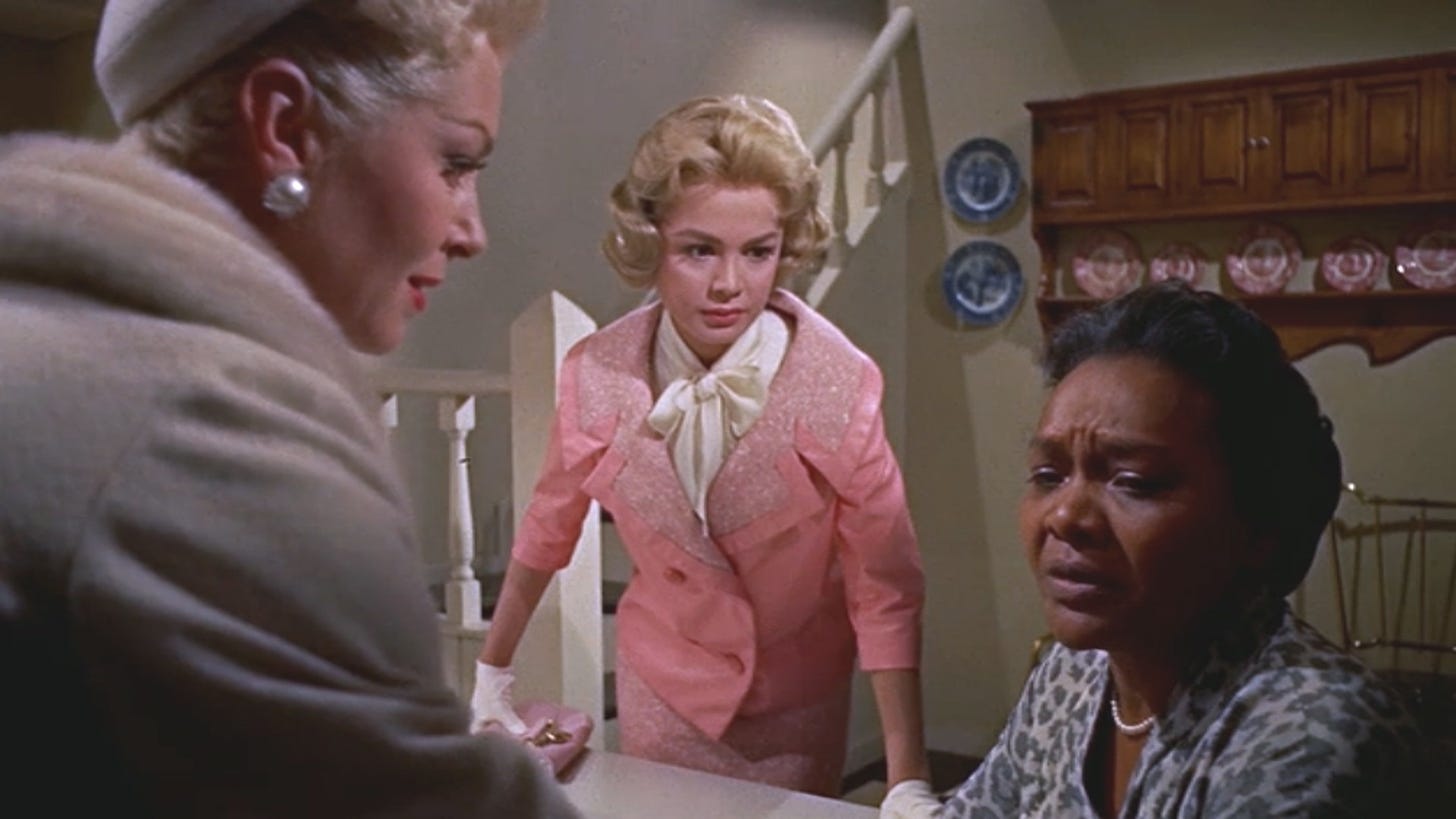
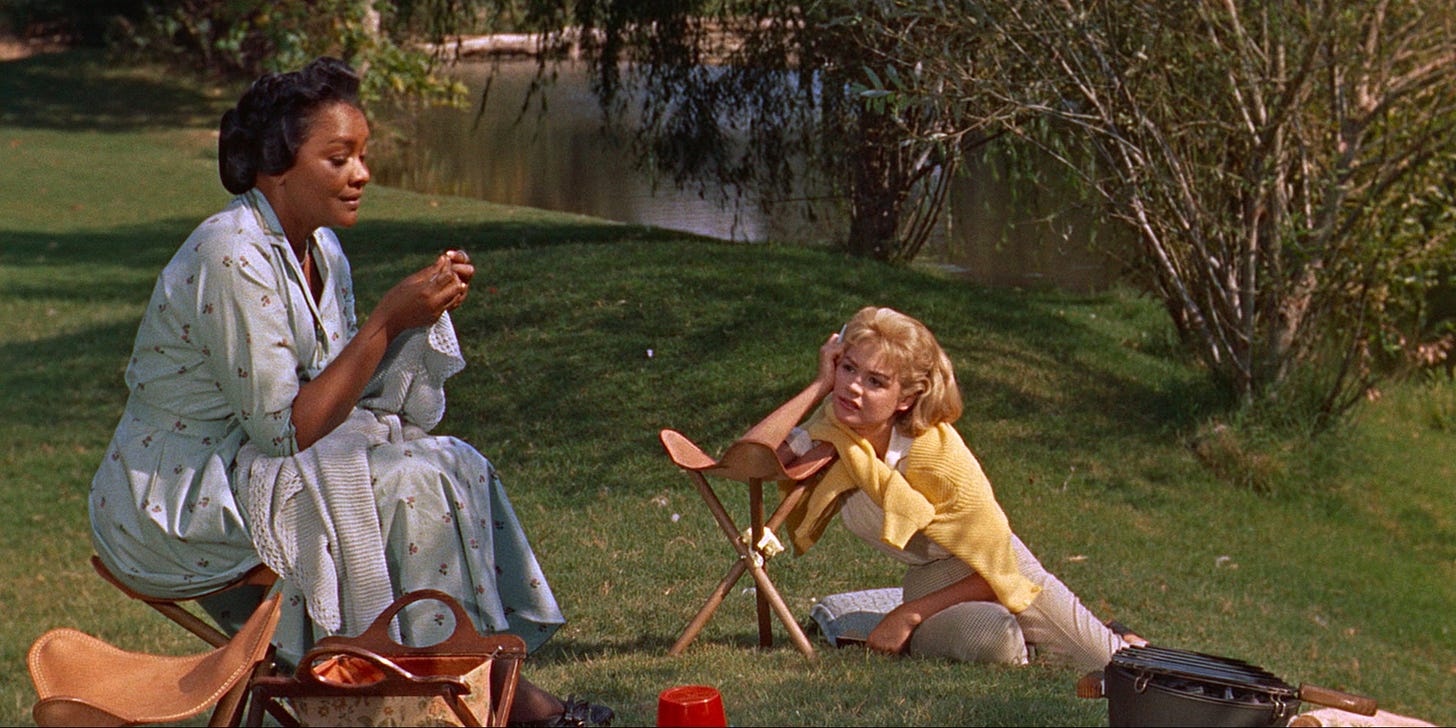
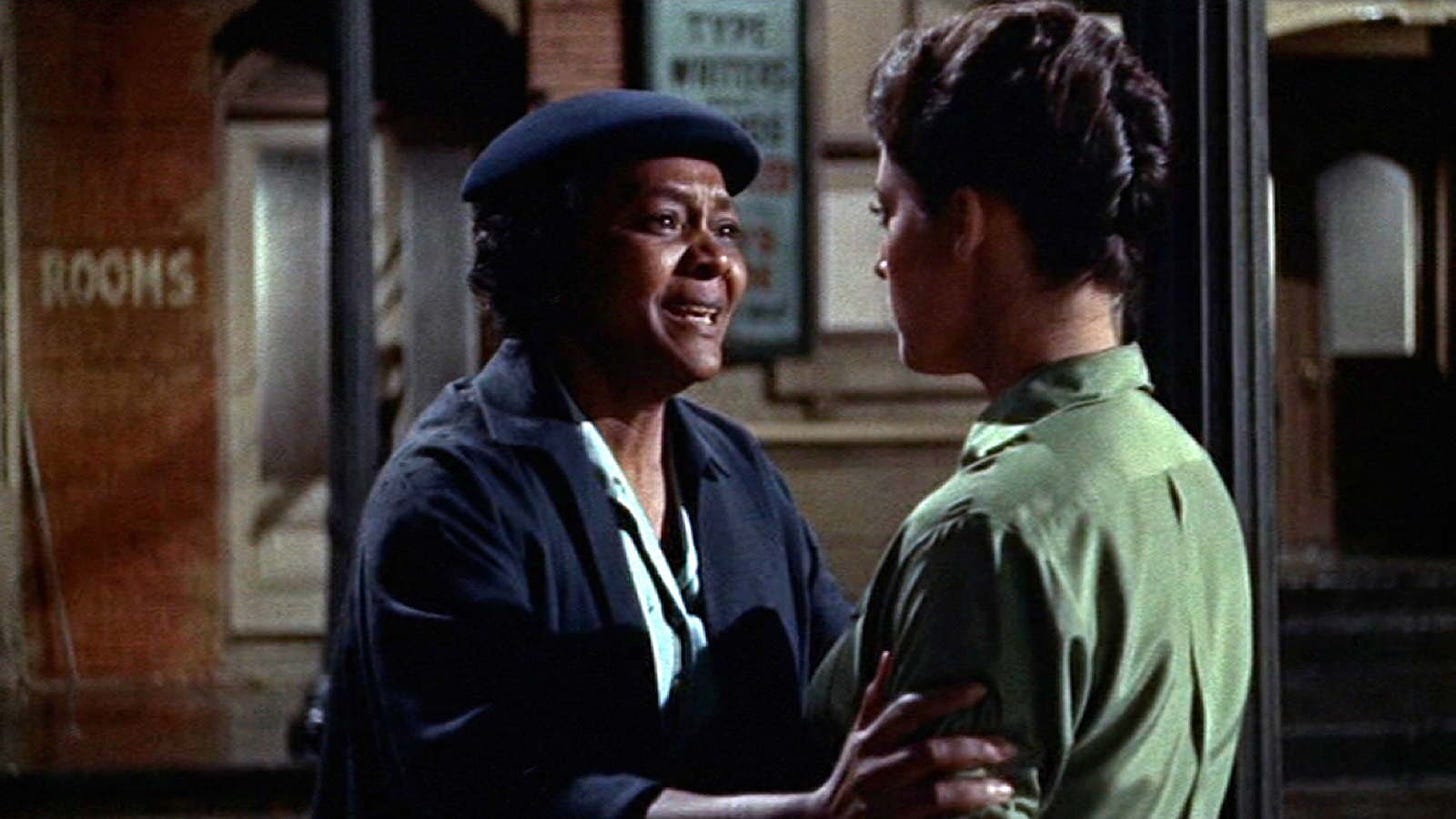
It's hard to critique something like Imitation of Life, not just because of its quality but because it was one of the very few movies of its era to address racial mores in any way. It's unfair to any one movie, or single piece of art to comment and address all the ins and outs of race in America.
That said... The big missing piece to me was the lack of interactions within the African American community. There's a throwaway line that Sarah Jane doesn't like fraternizing with her black peers because she sees them all as janitors and generally a lower class than what she aspires to. In reality (in my experience) the relationship could be just as fraught for Sarah Jane to integrate into that community as the white community (or you note from Passing). Its a big missing piece for me, but I can't fault Sirk for not exploring it. He was already playing with dynamite, and I remain surprised such a dark slice of Americana could be a box office success in its day. The changes he made to the story pull it into his show business orbit, something he could opine on with confidence. You sorta just have to applaud that he tried and didn't go to far over his skis--Except that funeral which is like a National Geographic matchup of every regional African American funeral tradition.
Love this series, but I do have one complaint: It's adding too many movies to my already overstuffed watchlist. :)